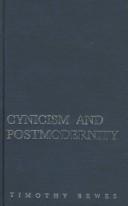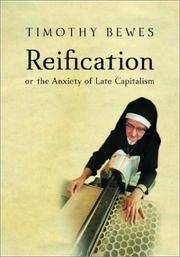| Listing 1 - 8 of 8 |
Sort by
|
Book
ISBN: 9780691141657 9780691141664 0691141665 Year: 2011 Volume: *7 Publisher: Princeton : Princeton University Press,
Abstract | Keywords | Export | Availability | Bookmark
 Loading...
Loading...Choose an application
- Reference Manager
- EndNote
- RefWorks (Direct export to RefWorks)
In a postcolonial world, where structures of power, hierarchy, and domination operate on a global scale, writers face an ethical and aesthetic dilemma: How to write without contributing to the inscription of inequality? How to process the colonial past without reverting to a pathology of self-disgust? Can literature ever be free of the shame of the postcolonial epoch--ever be truly postcolonial? As disparities of power seem only to be increasing, such questions are more urgent than ever. In this book, Timothy Bewes argues that shame is a dominant temperament in twentieth-century literature, and the key to understanding the ethics and aesthetics of the contemporary world. Drawing on thinkers such as Jean-Paul Sartre, Frantz Fanon, Theodor Adorno, and Gilles Deleuze, Bewes argues that in literature there is an "event" of shame that brings together these ethical and aesthetic tensions. Reading works by J. M. Coetzee, Joseph Conrad, Nadine Gordimer, V. S. Naipaul, Caryl Phillips, Ngugi wa Thiong'o, and Zoë Wicomb, Bewes presents a startling theory: the practices of postcolonial literature depend upon and repeat the same structures of thought and perception that made colonialism possible in the first place. As long as those structures remain in place, literature and critical thinking will remain steeped in shame. Offering a new mode of postcolonial reading, The Event of Postcolonial Shame demands a literature and a criticism that acknowledge their own ethical deficiency without seeking absolution from it.
Commonwealth literature (English) --- Postcolonialism in literature. --- History and criticism. --- 82:93 --- Literatuur en geschiedenis --- 82:93 Literatuur en geschiedenis --- Postcolonialism in literature --- History and criticism --- Commonwealth literature (English) - History and criticism

ISBN: 1859841961 9781859841969 Year: 1997 Publisher: London Verso
Abstract | Keywords | Export | Availability | Bookmark
 Loading...
Loading...Choose an application
- Reference Manager
- EndNote
- RefWorks (Direct export to RefWorks)
Cynicism. --- Postmodernism. --- Philosophy, Modern --- Civilization, Modern --- Philosophy, Modern - 20th century. --- Civilization, Modern - 1950 --- -Cynicism.
Book
ISBN: 1282936476 9786612936470 1400836492 9781400836499 9781282936478 9780691141657 0691141657 9780691141664 0691141665 Year: 2010 Publisher: Princeton, NJ
Abstract | Keywords | Export | Availability | Bookmark
 Loading...
Loading...Choose an application
- Reference Manager
- EndNote
- RefWorks (Direct export to RefWorks)
In a postcolonial world, where structures of power, hierarchy, and domination operate on a global scale, writers face an ethical and aesthetic dilemma: How to write without contributing to the inscription of inequality? How to process the colonial past without reverting to a pathology of self-disgust? Can literature ever be free of the shame of the postcolonial epoch--ever be truly postcolonial? As disparities of power seem only to be increasing, such questions are more urgent than ever. In this book, Timothy Bewes argues that shame is a dominant temperament in twentieth-century literature, and the key to understanding the ethics and aesthetics of the contemporary world. Drawing on thinkers such as Jean-Paul Sartre, Frantz Fanon, Theodor Adorno, and Gilles Deleuze, Bewes argues that in literature there is an "event" of shame that brings together these ethical and aesthetic tensions. Reading works by J. M. Coetzee, Joseph Conrad, Nadine Gordimer, V. S. Naipaul, Caryl Phillips, Ngugi wa Thiong'o, and Zoë Wicomb, Bewes presents a startling theory: the practices of postcolonial literature depend upon and repeat the same structures of thought and perception that made colonialism possible in the first place. As long as those structures remain in place, literature and critical thinking will remain steeped in shame. Offering a new mode of postcolonial reading, The Event of Postcolonial Shame demands a literature and a criticism that acknowledge their own ethical deficiency without seeking absolution from it.
Postcolonialism in literature. --- Commonwealth literature (English) --- History and criticism. --- Commonwealth literature (English) - History and criticism --- Postcolonialism in literature --- Act of Violence. --- Alain Badiou. --- Alterity. --- Antithesis. --- Autobiography. --- Being and Nothingness. --- Caryl Phillips. --- Colonialism. --- Conceptualization (information science). --- Conscience. --- Consciousness. --- Criticism. --- Critique. --- Culture and Imperialism. --- Cynicism (contemporary). --- Decolonization. --- Dialectic. --- Diegesis. --- Disenchantment. --- Disgrace. --- Disgust. --- Dusklands. --- Edward Said. --- Emblem. --- Essay. --- Ethics. --- Exclusion. --- Explanation. --- Fiction. --- Frantz Fanon. --- Franz Kafka. --- G. (novel). --- Gilles Deleuze. --- Giorgio Agamben. --- Henri Bergson. --- Humiliation. --- Ideology. --- Impossibility. --- In the Heart of the Country. --- Inseparability. --- Irony. --- J. M. Coetzee. --- Jean-Paul Sartre. --- Joseph Conrad. --- Kurtz (Heart of Darkness). --- Lag. --- Literature. --- Lord Jim. --- Michel Leiris. --- Minima Moralia. --- Modernity. --- Mrs. --- Nadine Gordimer. --- Narration. --- Narrative. --- Novelist. --- Objectivity (philosophy). --- Ontology. --- Pathos. --- Pessimism. --- Peter Hallward. --- Phenomenon. --- Philosopher. --- Philosophy. --- Pier Paolo Pasolini. --- Poetry. --- Politics. --- Positivism. --- Postmodernism. --- Potentiality and actuality. --- Primo Levi. --- Principle. --- Publication. --- Racism. --- Result. --- Rhetoric. --- Samuel Beckett. --- Self-hatred. --- Seven Pillars of Wisdom. --- Shame. --- Slavery. --- Slow Man. --- Subaltern (postcolonialism). --- Subjectivity. --- Suggestion. --- Superiority (short story). --- Symptom. --- T. E. Lawrence. --- Temporality. --- The Other Hand. --- The Philosopher. --- The Wretched of the Earth. --- Theodor W. Adorno. --- Theory of Forms. --- Theory. --- Thought. --- V. S. Naipaul. --- Vocation (poem). --- Writer. --- Writing.

ISBN: 1859844561 1859846858 Year: 2002 Publisher: London Verso
Abstract | Keywords | Export | Availability | Bookmark
 Loading...
Loading...Choose an application
- Reference Manager
- EndNote
- RefWorks (Direct export to RefWorks)
Civilization, Modern --- Philosophy, Modern --- Postmodernism --- Reality --- Reification --- Social perception --- Philosophy --- Social aspects
Digital
ISBN: 9781400836499 9780691141664 Year: 2010 Publisher: Princeton, N.J. Princeton University Press
Abstract | Keywords | Export | Availability | Bookmark
 Loading...
Loading...Choose an application
- Reference Manager
- EndNote
- RefWorks (Direct export to RefWorks)
Book
ISBN: 1283015854 1441157905 1441164677 1441187286 9786613015853 Year: 2011 Publisher: London Bloomsbury Publishing
Abstract | Keywords | Export | Availability | Bookmark
 Loading...
Loading...Choose an application
- Reference Manager
- EndNote
- RefWorks (Direct export to RefWorks)
Book
ISBN: 0853159653 Year: 2002 Publisher: London : Lawrence and Wishart,
Abstract | Keywords | Export | Availability | Bookmark
 Loading...
Loading...Choose an application
- Reference Manager
- EndNote
- RefWorks (Direct export to RefWorks)
Digital

ISBN: 9780748637010 9780748636990 Year: 2022 Publisher: Edinburgh Edinburgh University Press
Abstract | Keywords | Export | Availability | Bookmark
 Loading...
Loading...Choose an application
- Reference Manager
- EndNote
- RefWorks (Direct export to RefWorks)
| Listing 1 - 8 of 8 |
Sort by
|

 Search
Search Feedback
Feedback About UniCat
About UniCat  Help
Help News
News